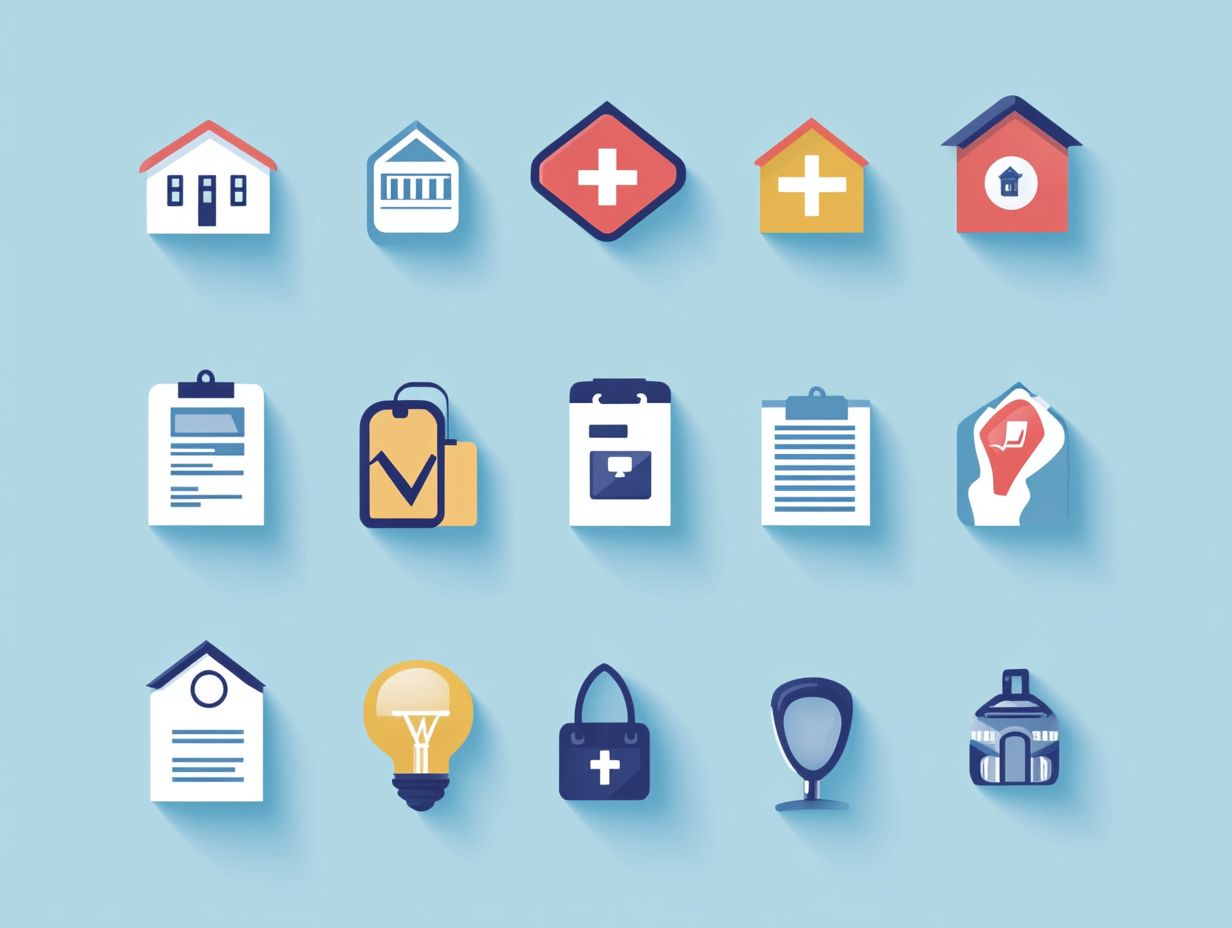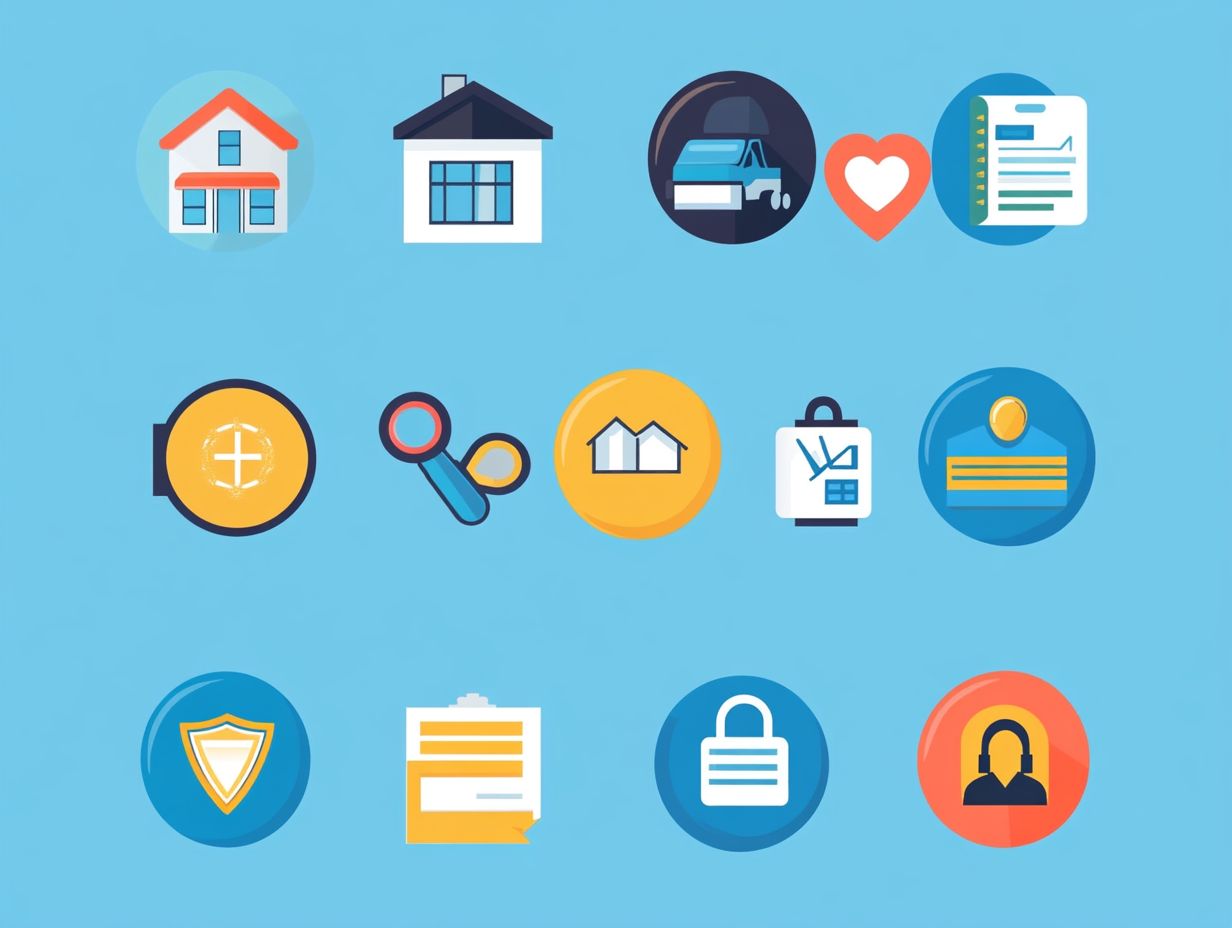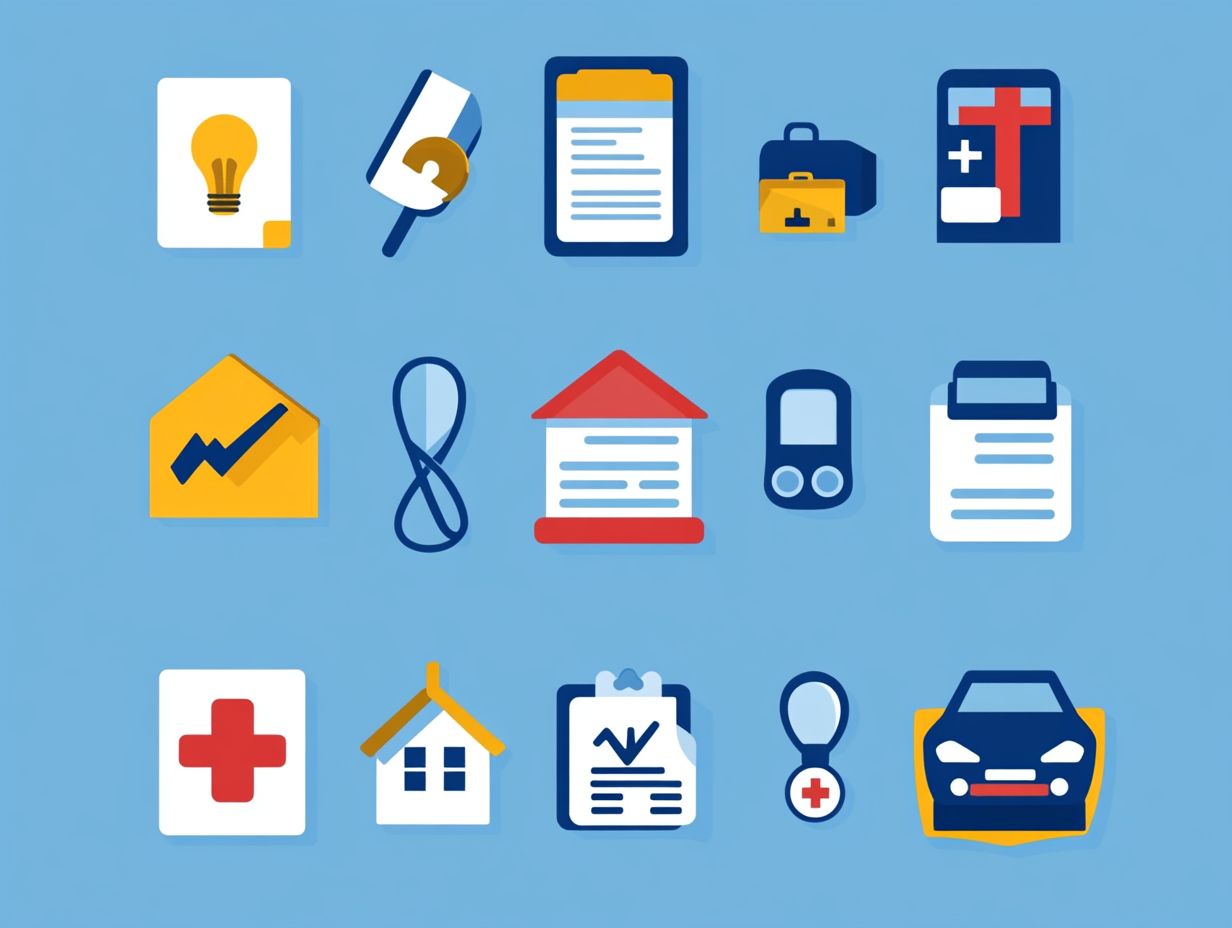10 Essential Insurance Policies?
In today’s unpredictable world, securing the right insurance coverage can profoundly impact your financial well-being.
With options ranging from health and auto insurance to specialized plans like pet and long-term care insurance, it s easy to feel overwhelmed by the choices.
This article will guide you through ten essential insurance policies worth considering. We will delve into their importance and provide tips for selecting the coverage that best fits your needs.
It also sheds light on common pitfalls to avoid and offers savvy money-saving strategies, empowering you to make informed decisions.
Prepare to navigate the insurance landscape with confidence and clarity!
Contents
- Key Takeaways:
- 1. Health Insurance
- 2. Life Insurance
- 3. Auto Insurance
- 4. Homeowners Insurance
- 5. Renters Insurance
- 6. Disability Insurance
- 7. Long-Term Care Insurance
- 8. Business Insurance
- 9. Umbrella Insurance
- 10. Pet Insurance
- What Is Insurance and Why Is It Important?
- Frequently Asked Questions
- What are the 10 Essential Insurance Policies?
- Why should I have these 10 Essential Insurance Policies?
- Which of the 10 Essential Insurance Policies is the most important?
- Do I need to have all 10 Essential Insurance Policies?
- Can I bundle these 10 Essential Insurance Policies for a better deal?
- Is it possible to customize these 10 Essential Insurance Policies?
Key Takeaways:

- Health insurance is essential for protecting against unexpected medical expenses and ensuring access to necessary healthcare.
- Life insurance provides financial security for loved ones in case of the policyholder’s death.
- Auto insurance is required by law and helps cover the costs of accidents, damage, and theft.
1. Health Insurance
Health insurance acts as a crucial safety net for you and your family. It offers essential health benefits mandated by the Affordable Care Act, including coverage for preventive services, mental health care, and maternity care. This alleviates the financial strain of unexpected medical expenses and ensures you have access to quality healthcare professionals through various plans.
Among the many options available, Marketplace plans cater to a broad spectrum of needs. They allow you to explore customized packages that suit your specific situation. Short-term health insurance serves as a temporary solution during transitional phases in life when you need a little extra support.
Essential Health Benefits plans guarantee coverage for ten critical benefit categories. These features are vital not just for your well-being but also for the health of the community, ensuring a standard of care that everyone can rely on.
With recent proposals circulating in Congress, there could be significant changes on the horizon that affect healthcare accessibility. Now is the time to understand these changes! Staying informed is crucial for your coverage options and benefits.
2. Life Insurance
Life insurance stands as a vital financial tool. It offers you and your loved ones not just financial protection but also peace of mind in the event of your passing. It ensures that those you care about will have the support they need during challenging times.
When considering these plans, understanding the array of options available is crucial. For instance, term life insurance provides coverage for a specified period, making it a cost-effective choice, particularly for young families looking to secure their financial future without breaking the bank.
Whole life insurance offers coverage for your entire lifetime, building cash value over time. This accumulation can serve as a financial safety net for emergencies or even as an investment opportunity down the line.
Then there’s universal life insurance, which adds flexibility with payment options while offering potential cash value growth.
Choosing the right coverage amount requires careful consideration of your existing debts, future expenses, and lifestyle aspirations. It s equally important to thoroughly understand the policy terms, as conditions and exclusions can significantly impact any claim you might need to make.
Remember, premiums are influenced by a variety of factors, including your age, health status, and lifestyle choices. A comprehensive evaluation of your personal circumstances is essential to make the best decision for your needs.
Take action today by evaluating your insurance needs or consulting with a professional regarding your options!
3. Auto Insurance
Auto insurance is vital for vehicle owners. It protects you from liability and covers damages from accidents, theft, and other unexpected events.
You have various coverage options available. For example, collision coverage handles damages to your vehicle after an accident.
Consider your driving history, vehicle type, and location. These factors significantly affect your monthly payments.
By taking the time to compare auto insurance quotes, you can uncover better savings and tailored policies that align with your specific needs, giving you the power to make informed decisions without unnecessary financial strain.
4. Homeowners Insurance
Homeowners insurance protects you against risks like fire, theft, and natural disasters. It also covers liability in case someone sues you.
This insurance covers your home’s structure and personal belongings. It also provides liability coverage if someone gets injured on your property.
Assess your home’s value through a professional appraisal. This helps determine the right coverage for your personal assets.
Evaluate these factors to ensure adequate protection. This grants you peace of mind during unforeseen challenges.
5. Renters Insurance
Renters insurance protects your belongings from theft or damage. It also offers liability coverage for accidents in your rental.
This insurance is crucial for security, especially for valuable items. It helps cover repair or replacement costs when unexpected incidents happen.
Assess your individual needs and living situation. Consider the value of your belongings and the necessary coverage limits.
6. Disability Insurance

Disability insurance protects your income if you can’t work due to illness or injury. It helps ensure your financial stability.
There are two types of coverage: short-term and long-term. Short-term typically covers three to six months, while long-term can last until retirement.
Consider your occupation, as some jobs have higher risks. If you have a higher income, you may need more coverage to maintain your lifestyle. Your personal circumstances also matter.
7. Long-Term Care Insurance
Long-term care insurance serves as an important way to plan your money if you’re considering how to address potential elder care needs. It ensures that you have access to the necessary services as you age.
By investing in this type of insurance, you can alleviate the financial burden that often comes with nursing homes, assisted living facilities, and in-home care arrangements. This coverage not only provides peace of mind but also gives you the power to make informed decisions about your care, free from the constraints of financial limitations.
When assessing a policy, it s crucial for you to explore various options, including daily benefit amounts, the duration of coverage, and eligibility requirements, such as age and health criteria. Factors like your age, health status, and family history of illness play a significant role in this decision, underscoring the importance of early planning to secure favorable terms.
8. Business Insurance
Business insurance is crucial for safeguarding your company against financial losses stemming from liabilities, property damage, and unforeseen risks. It gives you the power to manage risks effectively and maintain operational continuity.
It’s essential to understand the different types of coverage available.
- General liability insurance offers financial protection against claims arising from accidents or injuries on your business premises, shielding you from potential lawsuits.
- Property insurance covers damage to your physical assets, whether caused by fire, theft, or natural disasters, allowing your business to recover and rebuild without missing a beat.
- Workers’ compensation is vital for protecting your employees who may be injured on the job, addressing their medical expenses and lost wages.
Assess your risks today! Tailor your insurance portfolio to fit your unique business needs, ultimately reinforcing stability and confidence in your operations.
9. Umbrella Insurance
Umbrella insurance offers you extra protection against lawsuits that goes beyond the standard limits of your existing policies, providing essential protection against potentially significant financial setbacks from legal claims or lawsuits.
This coverage is particularly advantageous for those who may face higher risks think individuals with substantial assets, active lifestyles, or careers that put them in the public eye. It serves as a safety net, effectively filling the gaps left by your current policies, so that even unexpected incidents, like someone getting injured on your property or a car accident, can be managed without facing crippling financial consequences.
In doing so, it not only safeguards your wealth but also grants you peace of mind in your everyday activities.
When determining the right amount of umbrella coverage for yourself, consider your total assets, which include your home, savings, and investments, along with any potential risks you might encounter in your daily life. Evaluating aspects such as personal liability exposure, lifestyle choices, and even your future earnings helps identify the appropriate level of protection.
Typically, it’s wise to select a policy limit that exceeds your net worth to ensure you have sufficient coverage. Consulting with an insurance professional can also illuminate the necessary limits, aiding you in customizing your umbrella insurance to fit your unique situation perfectly.
10. Pet Insurance
Pet insurance acts as a vital safety net, protecting you from those unexpected veterinary bills that can arise at the most inconvenient times. It makes sure your pets get the care they deserve without placing a heavy financial burden on you.
You’ll find a variety of pet insurance policies available, ranging from comprehensive plans that cover a broad spectrum of services think routine check-ups, vaccinations, and emergency procedures to more specialized policies focused specifically on accidents or illnesses. Each option offers different levels of coverage that can significantly influence overall costs.
It’s essential for you to carefully review the specific terms of each policy, including deductibles, reimbursement rates, and exclusions. By taking the time to assess the potential costs of veterinary care alongside your policy options, you can make a well-informed decision that guarantees your furry companions receive the best care possible!
What Is Insurance and Why Is It Important?
Insurance is a complex system crafted to provide you with financial security by mitigating risks and safeguarding you and your business from unforeseen circumstances. This ensures that you can maintain peace of mind in a world that often feels unpredictable.
This proactive approach to risk management spans various sectors, including healthcare, automotive, and property, where uncertainties can result in significant financial strain. By distributing the financial impact of potential losses, insurance fosters resilience within you as a policyholder.
Whether you’re covering unexpected medical expenses, shielding your business from liability issues, or protecting your home from damage, insurance is essential in helping you navigate life’s challenges. It gives you the power to live confidently and pursue your goals, all while knowing you have a safety net ready for emergencies and unexpected events.
What Are the Different Types of Insurance Policies?

There are countless types of insurance policies available to you, including life insurance, health insurance, auto insurance, and property insurance each designed to meet specific needs and risks that you may encounter, whether in your personal life or your business endeavors.
Understanding these policies is essential for making informed decisions. Life insurance offers financial protection for your loved ones in the event of an untimely passing, while health insurance takes care of your medical expenses, providing peace of mind during unexpected health crises. Additionally, freelancers should consider 10 essential insurance types for freelancers to ensure comprehensive coverage.
Auto insurance, on the other hand, shields you from vehicle-related losses, covering damages and liabilities arising from accidents. Meanwhile, property insurance defends your physical assets from damage or theft.
Selecting the right policy hinges on your situation, such as your age, health status, asset value, and lifestyle, as well as your risk tolerance. By conducting a thorough assessment of these factors, you can pinpoint the most suitable coverage to safeguard against potential financial setbacks.
How Can Insurance Help Protect Your Finances?
Insurance serves as a vital safeguard for your finances, offering essential protection against significant risks. This not only promotes economic stability but also mitigates the potential impact of unforeseen events.
Health, auto, and home insurance are different forms of this protective layer, each tailored to specific needs. Picture this: you face a medical emergency, and your health insurance policy steps in, covering those daunting medical expenses while ensuring a seamless claims process.
This allows you to focus on what truly matters your recovery rather than being bogged down by bills. Similarly, when accidents happen on the road, auto insurance becomes your trusted ally, guiding you through the aftermath.
It helps with repairs and navigates the often-complex legal matters that can arise. Ultimately, having these protections in place cultivates a profound sense of security, giving you the power to confront life’s uncertainties with confidence.
You can feel secure and ready to tackle whatever life throws your way, knowing that you have a reliable support system ready to catch you when challenges come your way.
What Factors Should Be Considered When Choosing Insurance Policies?
When selecting insurance policies, you should take a moment to consider a range of factors, including coverage options, deductibles, premium costs, and the specific risks tied to your personal or business circumstances. This careful consideration ensures that you choose the plan that best suits your needs.
It s essential to assess your individual needs and risk profile, as these can greatly influence your coverage choices. By comparing the terms and conditions of different policies, you can pinpoint which options align most closely with your unique situation.
Understanding how various elements such as your age, health, or the nature of your business impact premium costs and overall coverage is crucial. This knowledge gives you the power to anticipate potential expenses and sidestep unwelcome surprises, ultimately leading to informed decisions and optimal financial protection.
What Are Some Common Mistakes People Make When Purchasing Insurance?
Common mistakes when purchasing insurance often include selecting inadequate coverage, overlooking the nuances of policy terms, and neglecting to compare different options for the best rates.
These oversights can lead to significant financial strain or unforeseen challenges in the future. Many rush their decision-making, failing to thoroughly evaluate their actual needs, which can result in choosing a policy that doesn t offer adequate protection.
To reduce these issues, it s essential to take the time to assess all available options, read policy details carefully, and seek advice from insurance professionals or knowledgeable friends. By doing so, you can understand the confusing world of insurance products more effectively and safeguard your financial well-being.
How Can You Save Money on Insurance Policies?
You can save money on insurance policies by employing a range of savvy strategies, such as taking advantage of discounts, bundling your policies, and diving into thorough comparisons to uncover the best rates.
To save more, consider exploring specific discounts for safe driving records, military service, or even loyalty rewards that come with being a long-term customer. Don t hesitate to reach out to insurers to negotiate rates; it s often a worthwhile endeavor, especially when you have alternatives at your fingertips.
Adjusting your coverage levels, like increasing deductibles on certain policies, can lead to lower premiums, allowing you to manage your budget without sacrificing essential protection. By implementing these practical methods, you enhance your financial management and gain peace of mind when it comes to future claims.
Many individuals seek coverage through the Marketplace plans, which can help meet coverage requirements while providing essential health benefits.
Frequently Asked Questions
What are the 10 Essential Insurance Policies?

- Health insurance
- Life insurance
- Homeowners insurance
- Auto insurance
- Disability insurance
- Long-term care insurance
- Business insurance
- Liability insurance
- Umbrella insurance
- Travel insurance
Why should I have these 10 Essential Insurance Policies?
These 10 essential insurance policies offer you financial protection and peace of mind in case of unexpected events such as accidents, injuries, illnesses, natural disasters, or legal liabilities. They can help you avoid potentially devastating financial losses.
Which of the 10 Essential Insurance Policies is the most important?
The most important insurance policy among the 10 essential ones depends on your personal or business needs. For example, health insurance may be the top priority for someone with a chronic illness, while business insurance may be crucial for a small business owner.
Do I need to have all 10 Essential Insurance Policies?
Not necessarily. It is recommended to have at least a few of these essential insurance policies, depending on your specific risks and needs. However, having all 10 can provide you with comprehensive coverage and greater protection.
Can I bundle these 10 Essential Insurance Policies for a better deal?
Yes, some insurance companies offer bundle packages that combine two or more of these essential insurance policies for a discounted rate. This can help you save money and simplify your insurance coverage.
Is it possible to customize these 10 Essential Insurance Policies?
Yes, you can customize these policies by adding optional coverages or riders to tailor them to your unique needs and preferences. It is recommended to discuss your options with an insurance agent or representative.
Don t wait until it s too late! Secure your future with these essential policies to ensure your financial protection and peace of mind.






